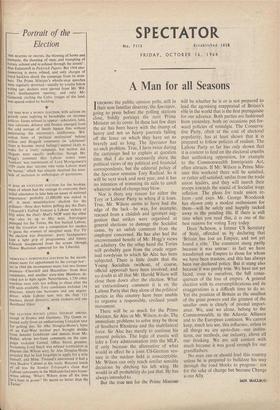A Man for Seasons
IGNORING the public opinion polls, still in their now familiar disarray, the Spectator, going to press before the polling stations close, boldly portrays the next Prime Minister on its cover. In these last few days the air has been heavy with the thump of heavy and not so heavy journals falling off the fence on which they have sat so bravely and so long. The Spectator has no such problem. True, I have twice during the campaign had to explain at question time that I do not necessarily share the political views of my political and financial, correspondents, but the editorial policy of the Spectator remains Tory Radical. So it will be next week and next year, and it has no intention of trimming its sails to catch whatever wind of change may blow.
Nor is there any reason for either the Tory or Labour Party to whine if it loses. True, Mr. Wilson seems to have had the edge of the luck—he was for example, rescued from a childish and ignorant sug- gestion that strikes were organised at general elections to damage the Socialist cause, by an oafish comment from the employer concerned. He has also had the uncovenanted benefit of Mr. Hogg's views on adultery. On the othwt hand the Tories will probably gain from the crude organ- ised rowdyism to which Sir Alec has been subjected. There is little doubt that the Young Socialists (without, of course, official approval) have been involved, and no doubt at all that Mr. Harold Wilson will close them down after the election. What an extraordinary comment it is on the Labour Party that they alone of the. political parties in this country have been unable to organise a responsible, civilised .youth movement.
There will be so much for the Prime Minister, Sir Alec or Mr. Wilson, to do. The immediate problems to solve may be those of Southern Rhodesia and the multilateral force. Sir Alec has merely to continue his present policies. The logic of events will take a Tory administration into the MLF, if only because- the alternative of what would in effect be a joint US-German ven- ture in the nuclear field is unacceptable. Mr. Wilson can only reach similar sensible decisions by ditching his left wing. He would in all probability do just that. He has always intended-to.
But the true test for the Prime Minister will be whether he is or is not prepared to lead the agonising reappraisal of Britain's role in the world that is the first prerequisite for our advance. Both parties are fashioned from yesterday, both on occasions put for- ward policies of nostalgia. The Conserva- tive Party, often at the cost of electoral popularity, has at least shown that it is prepared to follow policies of realism. The Labour Party so far has only shown that it is content to feed on the electoral crumbs that unthinking opposition, for example to the Commonwealth Immigrants Act, often attracts. If Mr. Wilson is Prime Min- ister this weekend there will be satisfied, or rather self-satisfied, smiles from the trade union leaders, and they will march their ,troops towards the sound of Socialist wage inflation. The plans for , trade union re- form—and even Mr. George Woodcock has shown only a modest enthusiasm for them—will be safely and happily tucked away in the pending tile. If there is still time when you read this, it is one of the best reasons for voting Tory today.
Dean Acheson, a former US Secretary of State, offended us by declaring that 'Britain has lost an Empire, and not yet found a role.' The comment stung partly because it was untrue : in fact we have transferred our Empire to those for whom we have been trustees, and this has always been our declared policy. But it stung also because it was partly true. We have not yet faced, even to ourselves, the full conse- quences of the loss of empire. A general election with its oversimplifications and its exaggerations is a difficult time to do so. Yet the position of Britain as the smallest of the great powers and the greatest of the smaller ones is clearly of pivotal import- ance. We, and we alone, belong to the Commonwealth, to the Atlantic Alliance and to the European continent. We cannot keep, much less use, this influence, unless in all things we are up-to-date—our institu- tions, our methods, our industry, above all our thinking. We are still content with much because it was good enough for our grandfathers. No man can or should lead this country unless he is prepared to bulldoze his way through the road blocks to progress : not for the sake of change but because Change is our Ally. -
LAIN MACLEOD,


































 Previous page
Previous page